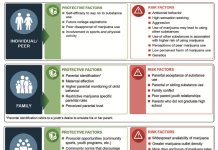Open Access Government produces compelling and informative news, publications, eBooks, and academic research articles for the public and private sector looking at health, diseases & conditions, workplace, research & innovation, digital transformation, government policy, environment, agriculture, energy, transport and more.
Home 2026
Archives
Safe and effective use of opioids for co-occurring disorders
Co-occurring disorders and clinical care for complex illnesses- safe and effective use of opioids may be only one of the areas where we need collaboration. Norm Buckley from the Michael G. DeGroote Institute for Pain Research & Care explains.
Adolescent polysubstance use: Time for a new public health approach
Ronan Fleury and Mary Cannon discuss the growing trend of polysubstance use among adolescents and highlight the need for a new public health strategy that reflects the complexities of adolescent substance use.
Semi-synthetic cannabinoids: A potent concern
Semi-synthetic cannabinoids have recently emerged as ‘lighter’ or ‘legal’ alternatives to cannabis, but they may be equally potent and equally risky, younger cousins.
Computational psychiatry and the opioid crisis: A deep dive
In this interview, we speak with Dr. Bo Cao, a leading expert in computational psychiatry at the University of Alberta, Canada. Dr. Cao discusses how advanced data analysis and machine learning are transforming our approach to the opioid crisis and mental health care, offering new hope in addressing one of North America’s most pressing public health challenges.
Safer and more effective use of opioids
The Pain PLUS literature surveillance service demonstrates the importance of high-quality literature to support decision-making and practice for the use of opioids.
Detoxification: The science behind social media claims of detox health benefits
Jessie R. Badley and Pamela J. Lein from the University of California, Davis, explain the science behind detoxification and the claims of detox health benefits in social media and the deception associated with it.
Risk factors for cannabis use in young people
With cannabis use among young people on the rise, Ronan Fleury, Prof Bobby Smyth and Prof Mary Cannon. discuss the mental and physical impacts and the importance of understanding the risk factors.
Can the arts be an effective tool to combat psychosis stigma?
There has been a rise in stigma for mental illnesses over the past few decades, particularly for psychotic symptoms. However, artistic representation may be the key to eliminating psychosis stigma.
The opioid crisis in canada – Governmental responses and strategies
Norm Buckley, Scientific Director at the Michael G. DeGroote Institute for Pain Research & Care, and Jason Busse, Director of the Michael G DeGroote National Pain Centre at McMaster University, discuss the complexities of chronic pain management and addressing the opioid crisis.
Who will staff the psychedelic resurgence?
Who will staff the psychedelic resurgence? Erika Dyck, Professor and Canada Research Chair in History of Health & Social Justice from the University of Saskatchewan, provides an intriguing answer to this question.
The extent and impact of the opioid crisis in Canada
The opioid crisis in Canada has been an issue for nearly a quarter of a century. Here, Norm Buckley and Jason Busse from the Michael G DeGroote Institute for Pain Research and Care, and the National Pain Centre discuss the issue, its effects both general and on specific communities, and what can be done about it.
Will psychedelic research and the ‘psychedelic renaissance’ create another generational divide?
Erika Dyck, Canada Research Chair in History of Health & Social Justice at the University of Saskatchewan, discusses changing attitudes to psychedelics and the challenges in forming a strong evidence base from available psychedelic research.
The role of prescribing practices in managing chronic pain with opioids
Norm Buckley and Jason Busse from the Michael G. DeGroote Institute for Pain Research and Care discuss prescribing practices, managing chronic pain with opioids, and the contribution of licit and illicit opioids towards the Canadian opioid crisis.
Psychotic-like experiences: What are they and why are they important?
Dr Lorna Staines and Professor Mary Cannon of RCSI University of Medicine and Health Sciences, explore psychotic-like experiences, explaining what they are and why they are important.
What is at stake in the psychedelic renaissance?
Professor Erika Dyck, Canada Research Chair in the History of Health & Social Justice, discusses the extensive history and growing medical application of psychedelics known as the psychedelic renaissance.
Exploring the effects of medical cannabis for chronic pain
Dr Simon Erridge of Sapphire Medical Clinics discusses the therapeutic effects of medical cannabis for chronic pain, affecting 15.5 million people in England and why more evidence is needed to support greater patient access.
Psychedelic therapies: The case for a new focus in the EU’s mental health care...
Tadeusz Hawrot, Founder and Executive Director of PAREA, states the case for a new focus in the EU’s mental health care approach, that is the underserved area of psychedelic therapies.
The history of psychedelics and why psychedelic stories matter
Erika Dyck delves into the history of psychedelics, exploring how these substances have piqued the interest and influenced the attitudes of individuals across academia, culture, and medicine.
Using of opioids for chronic pain: Controversies, guidelines, research needs
First in a series of five articles, Norm Buckley and Jason Busse explore the trials and tribulations associated with using opioids for chronic pain, particularly in Canada.
Neuronal networks of depression: Pushing the limits of brain stimulation technology
A team of researchers at the University of Freiburg and Delft University of Technology have joined forces to explore a new focused ultrasound technology to tap into the Neuronal Networks of Depression.





















